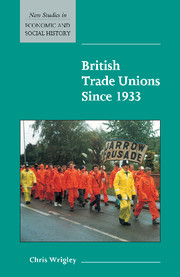Book contents
- Frontmatter
- Contents
- List of tables
- 1 Introduction
- 2 Economic recovery and war, 1933–1945
- 3 Trade union development, 1945–2000
- 4 Strikes, 1945–2000
- 5 Incomes policies, 1948–1979
- 6 Trade union legislation, 1945–2000
- 7 What have trade unions done?
- List of references
- Index
- Studies in Economic and Social History
- New Studies in Economic and Social History
6 - Trade union legislation, 1945–2000
Published online by Cambridge University Press: 05 June 2012
- Frontmatter
- Contents
- List of tables
- 1 Introduction
- 2 Economic recovery and war, 1933–1945
- 3 Trade union development, 1945–2000
- 4 Strikes, 1945–2000
- 5 Incomes policies, 1948–1979
- 6 Trade union legislation, 1945–2000
- 7 What have trade unions done?
- List of references
- Index
- Studies in Economic and Social History
- New Studies in Economic and Social History
Summary
For most of three and a half decades after the Second World War, British trade unionism had considerable freedom to act without fear of civil actions in the law courts under the Trade Disputes Act, 1906. This freedom was curtailed during the World Wars, under the Trade Disputes and Trade Union Act, 1927 (which was repealed by the Trade Union Act, 1946), by the Industrial Relations Act, 1971 (mostly repealed by the Trade Union and Labour Relations Act, 1974), and by a plethora of legislation in 1980–93. The legislation of the last three decades of the twentieth century came largely in response to concerns about trade union power affecting price stability, employment levels and economic growth, but concerns over freedom of individual choice were also expressed.
The flexibility of the voluntary nature of the British system of industrial relations was much admired by many academic commentators, most trade unionists and substantial numbers of employers after the Second World War. Otto Kahn-Freund, the eminent scholar of British, comparative and international labour law who had left Germany in 1933, contrasted very favourably the ‘dynamic’ British system with the ‘static’ systems elsewhere, notably in Weimar Germany (1918–33), other parts of Europe and the United States, which were tied up in legal contracts and regulations. (Kahn-Freund, 1954). As a member of the 1965–8 Royal Commission on Trade Unions and Employers' Associations (the Donovan Commission), he and other members found that circumstances had altered and that there was a need to respond to the results of the decentralisation of pay bargaining, which had been brought about by changed business strategies, and also to the growth in power of shop stewards.
- Type
- Chapter
- Information
- British Trade Unions since 1933 , pp. 67 - 80Publisher: Cambridge University PressPrint publication year: 2002

